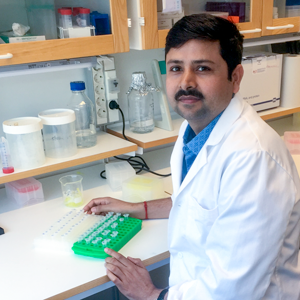Contact
mukesh.dubey@slu.se, 018-672540

The fungus Clonostachys rosea has great potential as a future biocontrol agent against several fungal diseases. A new study from SLU reveals more information on the mechanisms behind the biocontrol and two previously unknown compounds involved in the biocontrol is characterized.
Clonostachys rosea is a mycoparasitic fungus that usually kills its host. The fungus has a broad host range and has evolved strategies to compete with other fungi by producing bioactive secondary metabolites. Because of this C. rosea is very useful as a biological control agent of plant diseases, especially in agricultural production systems.
So, we know that C. rosea is a good biological control agent, but what are the actual mechanisms behind this? Polyketides are a group of secondary metabolites that have different biological functions. They are encoded by genes called PKS. However, surprisingly little is known about the function of these genes.
– We wanted to investigate this interesting gene cluster that seemed to be induced when C. rosea interacted with the fungal plant pathogens Botrytis cinerea and Fusarium graminearum, says Magnus Karlsson, researcher at CBC, Centre for Biological Control and at the Department of Forest Mycology and Plant Pathology.
The results from the study showed that genes in the PKS cluster were required for producing antifungal compounds.
– We showed that the expression of PKS genes were regulated both by nutrient conditions and by interactions with other fungi. We also identified two previously unknown polyketide compounds with strong activity against both B. cinerea and F. graminearum that we are now calling Clonorosein A and B, says Mukesh Dubey at the Department of Forest Mycology and Plant Pathology.
– The study provides another piece of the puzzle towards understanding and improving biocontrol with C. rosea, says Mukesh Dubey.
mukesh.dubey@slu.se, 018-672540
Read the whole study here: https://www.nature.com/articles/s41598-018-33391-1